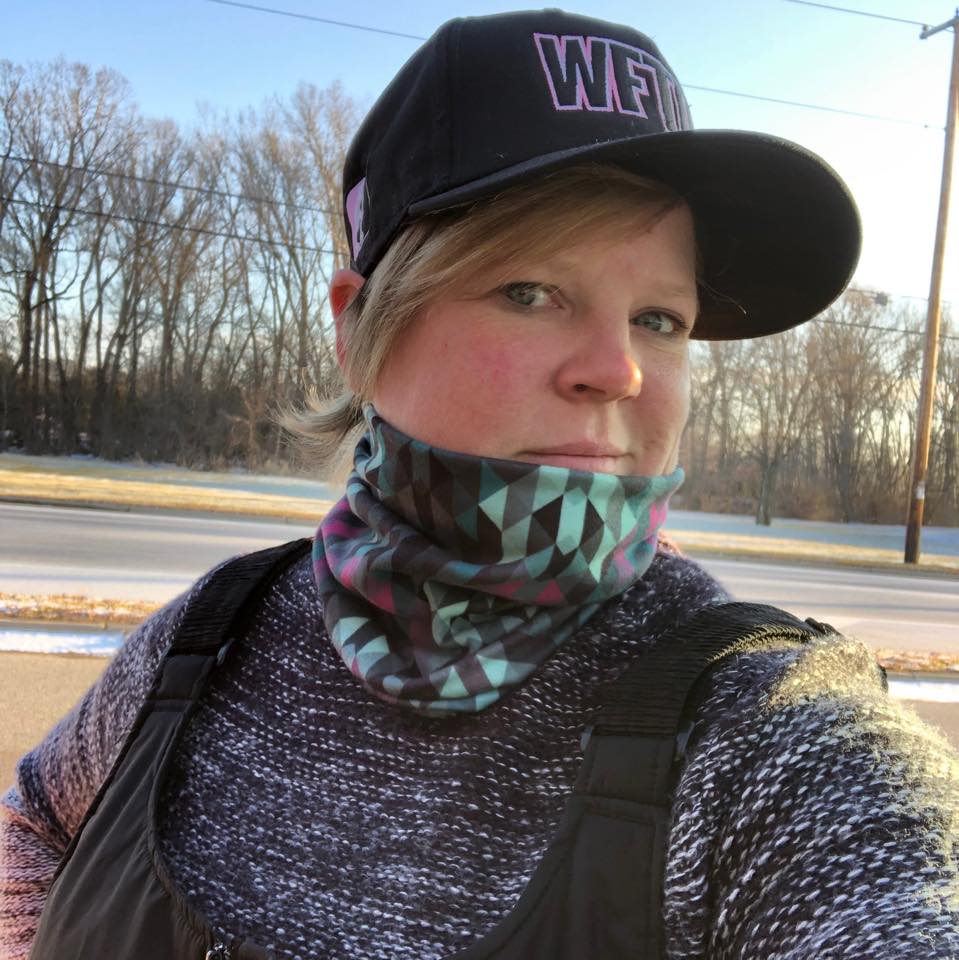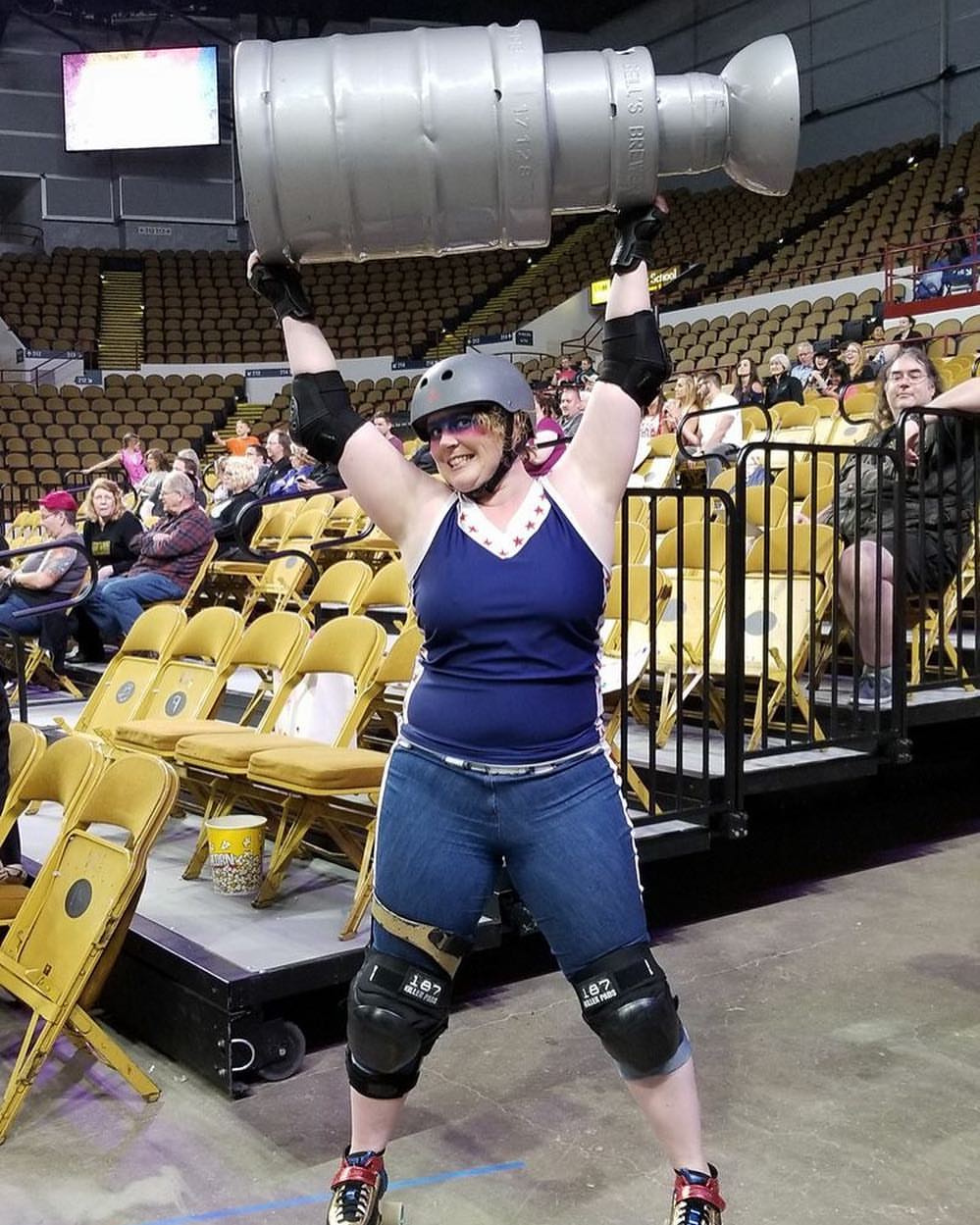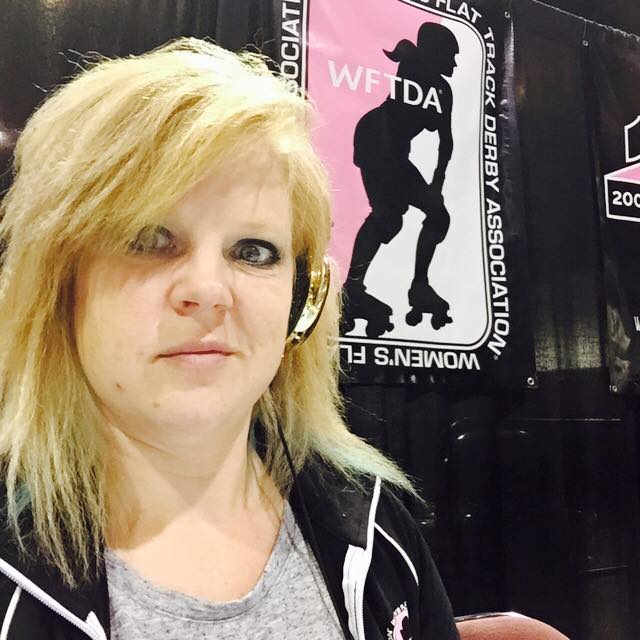
Spotlight on Tournaments: Education Meets Grace Killy to Talk About GTOing
by Catherine Beat-Her Bonez
It is WFTDA Postseason time, so we are shifting our focus on all things Tournament fun for the next few Education Meets articles. For today’s post, I talked to the amazing Grace Killy about the importance of the Games Tournament Oversight (GTO) officer, the history of it, and how you can train to become a GTO yourself.
Fun side note: Killy was too modest in our interview to actually portray her importance in the WFTDA. She has influenced the sport and the organization in so many ways – not just as a long term GTO, but also as one of the longest serving members of the WFTDA Board of Directors.

So without further ado, we are happy to introduce you (again) to Grace Killy. If you are at the 2019 WFTDA Continental Cup – Europe in Helsinki, say hi to her (but don’t distract her from the important work of GTO).
CBHB: Okay, let’s start by introducing you. Who are you?
Grace Killy: My name is Anna Krajcik and my derby name is Grace Killy. I’m a Skater and sometime Official for the Brewcity Bruisers in Milwaukee, Wisconsin USA. I’ve just finished my 13th season skating and was a 10 year volunteer with the WFTDA. I’ve also had a variety of positions for the Brewcity Bruisers including Art Director and Vice President. I further play the Irish sport of Hurling/Camogie and have competed at the National and World level for that sport.
With WFTDA, I started as a league representative and took a job as an IGRF processor on the Sanctioning Committee back when people would actually MAIL me paperwork to enter each month when games were played.* I spent time as the Sanctioning Chair and as the Games Officer before taking a position on the Board of Directors.
*Note: Overseeing completion of the Interleague Game Reporting Form (IGRF) from the WFTDA StatsBook as well as submitting scores and IGRFs to WFTDA Sanctioning by the deadline, is part of the GTO job responsibilities.
CBHB: That is a really good segue into our topic – Games Tournament Oversight. What is a GTO and what does the position entail?
Killy: The Games Tournament Oversight is a liaison between the Skaters and the tournament organizers, Officials and the WFTDA policies for play such as the Sanctioning, Uniform or Expulsion Policies. However, the GTO can also help mediate any issues that Officials or other participants might have.
Basically, they are the final authority on games policies and an expert on “Who Knows the Answer” when other questions or issues come up. They help keep the games running smoothly, and help to advocate for the Skaters when something isn’t going right for everyone. The job of the GTO is also to apply expectations and policies fairly across all teams and to make sure that any concerns that the Skaters might have are communicated to organizers and Tournament Head Officials.

CBHB: As you have been part of the creation of this position and you know the history of the GTO role, can you tell us a bit about how it all started?
Killy: The Position of GTO started with Danecia Berrian (Nina Knockout) from Philly Roller Derby to help the league manage their tournament, East Coast Derby Extravaganza. Danecia and I worked together as WFTDA Games Co-Chairs to develop the role of GTO for use at WFTDA Playoff and Championship tournaments. The first time the position was used was at the Derby in Dairyland, the 2008 Eastern Playoffs hosted by Madison Roller Derby.
CBHB: Wow – This is 10 years ago! So excuse this short interruption in our interview as we will be doing something else for a change.
Read All About How the Role of the GTO Has Developed Over Time
Originally, the position was staffed by WFTDA committee chairs and Officers of the Games Committee, who were all basically Skaters. It branched out to include Officials as Officials filled some of these Games positions. Committee Chairs were asked to come train at an event with an existing GTO and then would take on GTO positions themselves. For example, WFTDA’s Senior Director of Programs, Bones, trained at 2011 ECDX with Nina before training with Bonnie Thunders at Western Regionals in 2011, and then became a WFTDA Playoffs GTO at Eastern Regionals in 2012. Bones later brought the role to Europe and South America when WFTDA supported tournaments in these regions.
Now, Bones along with the WFTDA Games Officer, Nell Bomb, and the Sanctioning Chair, Reckless—all three GTOs—worked over the years to develop the online learning program. WFTDA grew the position by requiring a trained GTO for all tournaments, and have created a full community of GTOs around the globe. There is now a much more diverse group of GTOs because the training is open to anyone, and tournaments may select anyone as long as they are trained.
The GTO online training consists of 5 learning modules and a test. Every GTO has to complete this curriculum before they can be added to the GTO community and available for Recognized or WFTDA Tournaments. You can request to be added to the training here.
CBHB: I would like to go back to something you said earlier about the GTO helping to advocate for Skaters. Can you tell me a bit more about this?
Killy: Really, the most important part of the position for me is to be an advocate for the Skaters at the event. Not every team is comfortable going directly to the Officials with issues, especially when that issue might be with a specific Official or event volunteer, and the GTO provides a neutral party who’s also an expert in the policies and best practices for the event and can help that team or Skater navigate the options to resolve an issue. Sometimes, it’s just lending a sympathetic ear to hear concerns, and sometimes it requires taking an active role in providing feedback or input on the next day’s plan. Having that neutral party when something goes wrong at an event is really important. Anything from Skater misconduct to fan interference on the track which impacts the results of a game can happen and having someone with no vested interest in the outcome of the game can be helpful in ensuring a fair result for all involved.
I also think it’s important to come at the position from the viewpoint of a Skater. There are lots of things that come up or are important to the Skaters that aren’t evident to folks who come from other walks of derby. That doesn’t mean that an Official or other type of volunteer can’t make an excellent GTO, but it does mean that they will need to work to shift their perspective and think about tournament situations from that Skater/team perspective and really listen to that point of view in working through issues.

CBHB: You are not just a GTO yourself, you are also training other GTOs. At the European Continental Cup, for example, you will have 2 GTO trainees. How will you work with them? Do you have any tips and tricks?
Killy: Training someone as a GTO, like any training, is done best by getting to know that person’s learning style and adjusting the information accordingly. The way that I’ve found works most often is the have that person shadow on the entire process. The Online Learning course gives a great background on the process and a lot of trainees who want to learn the position start on much better footing than folks used to.
Typically, when I’m training, there are a couple of stages:
- The first thing we do is the pre-tournament paperwork. I have the shadows copied on all of the paperwork and often delegate sections to them to complete, and then I check their work and answer any questions they might have.
- I also review all the policies with them before the event so that they are familiar with them when an issue comes up at an event.
- The onsite training tends to be more dependent on what happens at the event. This is a very much hands on learning experience. As things like Expulsion meetings, Uniform Selections, and any other issues come up, I make sure to include the shadows in those meetings and discussions to give them an example of how to manage things.
- Another thing that I try to do while there’s nothing “exciting” going on is to review possible things that could happen. Other great skills to go over are mediation and meeting management when you have a lot of strong personalities to work with.
CBHB: Thank you, Killy for your time and dedication.
Wondering What Makes a Good GTO?
Good GTO candidates are people who have the ability to multitask, keep calm and keep others calm in stressful situations, and have enough tournaments and roller derby experience to succeed in the role. The GTO works alongside Head Officials and supports them, but a GTO is not an Official. GTOs are responsible for sanctioning and ensuring StatsBooks are completed, but should not do the stats or they will lose their oversight perspective. This is a great role for Officials who want to understand more about the skater side of things, and is an amazing position for Skaters who are looking to continue to be involved with the sport even after their skating career is ending.
For anyone who is interested in becoming a GTO:
- Find more information on the program or the detailed GTO job description under Competition > GTO on resources.wftda.com.
- This year’s Postseason GTOs can be found at WFTDA Tournament Central on wftda.com.
- Have a tournament upcoming and need a GTO? If you look at our GTO Roster, we have GTOs of all types of backgrounds all over the world, and the list is growing.
Here at WFTDA Education we’re always on the lookout for interesting topics to learn about, so if you know of any people or leagues who deserve coverage, please reach out to us here.
We’re also looking for copywriters, editors, and proofers of all this content. If you or someone you know would like to volunteer, please email us at marketing@wftda.com.